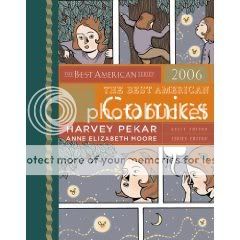The Best American Comics 2006
Anne Elizabeth Moore, series editor
Harvey Pekar, guest editor
Joel Priddy, Kim Deitch, Anders Nilsen, Lilli Carré, David Lasky, Ben Katchor, Alison Bechdel, Joe Sacco, Justin Hall, Chris Ware, Rebecca Dart, Ivan Brunetti, Jonathan Bennett, Jaime Hernandez, Esther Pearl Watson, John Porcellino, David Heatley, Lloyd Dangle, Hob, Gilbert Shelton, Olivia Schanzer, Alex Robinson, Jessica Abel, Seth Tobocman, Terisa Turner, Leigh Brownhill, Rick Geary, Tom Hart, Kurt Wolfgang, Jesse Reklaw, Lynda Barry, Robert Crumb, writers/artists
Houghton Mifflin, October 2006
320 pages
$22
Pretty much all of the big hardcover comics anthologies published by non-comics publishers over the past few years have been obsessed to the point of neurosis with proving the worth of the medium to readers of pictureless literature. Nowhere has goal been made more explicit than in the introductions to this volume provided by editors Anne Elizabeth Moore and Harvey “American Splendor” Pekar. Moore does it using that good-ol’ “the disreputable comics of yore have blossomed into a bona fide ninth art, but look out, they’d still get you kicked out of study hall” reverse-psychology formulation, while Harv once again recounts his “bitten by a radioactive Crumb” origin story and how he’s been fighting for comics-as-literature since the days of the undergrounds.
But the funny thing is that compared to Ivan Brunetti’s Yale-published Anthologies of Graphic Fiction or Chris Ware’s McSweeney’s collection, this book feels the least concerned with making a swing-for-the-fences, for-the-ages case for the greatness of comics. Perhaps it’s because it’s shorter; perhaps it’s because the fairly well-documented neuroses of its editors are nonetheless of a different, less labor-intensive variety than those of Brunetti and Ware. I think it’s most likely because Moore (who selected 150 candidates for inclusion here) and Pekar (who picked his 30 favorites from that pool) cast their net a little wider, or at least in a different direction, than the anthologies we’re used to. The aforementioned Brunetti and Ware efforts tended to draw their conclusions from a fairly familiar comics-as-high-art canon: classic newspaper strips, the undergrounds, Raw, people published by Fantagraphics and Drawn & Quarterly during the ’90s, and Kramers Ergot. This edition of Best American drags in some alt-weekly strips, some World War 3 Illustrated alums, some vets of non-“Big Two” altcomix imprints like AdHouse and Alternative, self-publishers who aren’t from the Fort Thunder/Highwater/NON/Kramers tradition, etc.
The result is less cohesive than more high-falutin’ efforts–given its mission statement, it seems odd to lead off with an extended stick-figure superhero parody from Joel Priddy, for example. It has its fare share of duds, including a few of the then-young anthology series Mome‘s less impressive stories, excerpts from longer slice-of-life fiction works that come across inert outside their original contexts, and a lengthy autobio piece from Jesse Reklaw about his childhood cats that basically made me want to punch him and every member of his family in the face for mistreating and neglecting helpless animals for year after year. Moreover, I’ve never had much use for the aesthetics of the aforementioned alt-weekly strips or World War 3 Illustrated stuff, and that trend remains un-bucked. And I don’t know if it’s me coming to a canon naturally or the canon shaping my preferences or what, but I think on a surface level the material here is on average less visually sophisticated and appealing than what you’d find in one of those Brunetti books.
But there’s a sense of playfulness and fun in these selections that you also don’t find in this anthology’s more studied counterparts, a feeling that you’re engaging with artists who don’t usually get this high-profile an outlet for their work, or this high-level an imprimatur for it either. For example, I think the book’s real revelation, and also its longest contribution, is the non-fiction “La Rubia Loca” by Justin Hall–a cartoonist best known for gay erotica–which tells the story of a manic, possibly schizophrenic woman’s ill-fated trip through the Mexican wilderness with both insightful sensitivity and genuine page-turning suspense. Another standout is “Rabbithead,” an ambitious, flawed, bizarre, singular work of dark fantasy by Rebecca Dart that functions like a cross between a good Guillermo Del Toro movie (I’m told they exist!) and Richard McGuire’s “Here.” This is not to say that the usual suspects are absent–far from it. There are several strong, oft-anthologized pieces in here: from Joe Sacco (on Iraq), David Heatley (on his Dad–say what you want, that strip’s funny!), Chris Ware (on the “history of comics”). But there are also some killers I haven’t seen outside their original homes. John Porcellino’s “Chemical Plant/Another World” is the real world-beater among them, astonishingly evocative of a particular setting yet also masterful in how it translates lived experience into abstraction, prefiguring similar works by the likes of Kevin Huizenga or Anders Nilsen. Robert Crumb’s “Walkin’ the Streets,” from a recent (!) issue of Last Gasp’s Zap, wows as usual with its powerfully rendered art, this time coupled to a comparatively deadpan recounting of life with his profoundly dysfunctional family–and to a happy ending! Ben Katchor’s “Goner Pillow Company” is as pitch-perfect as everything else I’ve read by him and makes me wish his Metropolis material gets collected toot sweet. There’s even an astutely selected passage from Anders Nilsen’s underrated chronicle of vaguely post-apocalyptic perambulation Dogs and Water.
I think maybe the best way to understand this anthology is as a replacement for a visit to an altcomix convention like MoCCA or SPX. At those shows, you stroll around with eyes and wallet open, picking up stuff from the big Fanta table in the corner, but also taking a few chances with unfamiliar stuff, or with work from someone you’ve seen at every one of these shows for years but never quite clicked with. You go out of your comfort zone a bit, you take some risks that don’t pay off, but, to quote Pekar’s introduction, “you may be pleasantly surprised.”
Tags: comics, comics reviews, Comics Time, reviews

